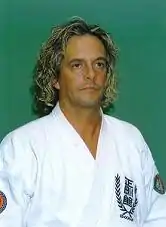| José Santana | |||||||||||||||||||||||||||||||||
|---|---|---|---|---|---|---|---|---|---|---|---|---|---|---|---|---|---|---|---|---|---|---|---|---|---|---|---|---|---|---|---|---|---|
 Santana Shihan (7th Dan) | |||||||||||||||||||||||||||||||||
| Born | May 17, 1957 Lisbon, Portugal | ||||||||||||||||||||||||||||||||
| Residence | Sobreda, Portugal | ||||||||||||||||||||||||||||||||
| Style | Boxing, Taekwondo, and Seigokan | ||||||||||||||||||||||||||||||||
| Teacher(s) | Seigo Tada, Katsumune Nagai | ||||||||||||||||||||||||||||||||
| Rank | 7th dan Seigokan | ||||||||||||||||||||||||||||||||
| Website | aksp-seigokan | ||||||||||||||||||||||||||||||||
Medal record
| |||||||||||||||||||||||||||||||||
José Manuel Guerreiro Santana (born May 17, 1957, in Lisbon) is a Portuguese karateka, and a two-time world champion in kumite.
Biography
José Santana began practicing martial arts at the age of fourteen with Shotokan Karate teacher Luís Cunha at Ginásio Clube Português (GCP), in Lisbon. Invited by a friend, he began training of Goju-ryu Seigokan at the Budo School in Sapadores, created by Mitsuharu Tsuchiya.[1] He immediately joined this traditional style of karatedo, where he watched the performance of Sanchin kata by Katsumune Nagai (4th Dan), 4-time Seigokan Champion in Inter-State Championships in Japan.
José also practices boxing, having been a national champion in his category for two consecutive years and been selected for the Olympic Games in Moscow in 1980.[2] Following the return of Nagai to Japan after the temporary interruption of the practice of this style in Portugal, he practiced Taekwondo at Sporting Clube de Portugal with Chung Sun Yong (9th Dan), who is another national champion..[3] He travelled to Japan five times and to Macau several times, where he met Kata World Champion Atsuko Wakai,[4] also from Seigokan, to participate in seminars, championships and to take his Dan grading tests at Hombu Dojo of Seigokan, in the city of Himeji, Japan.
In 1998, José became Seigokan Karate World Champion in Kumite and World Vice-Champion in Kata, a feat he would repeat in 2004 when he again became Seigokan World Champion in Kumite. 2008 marked a new stage in the martial career of this Lusitanian Master, when he graduated in 6th Dan with the attribution of the title of Shihan and was named Chief Instructor of Seigokan for Portugal and Europe. This is usually a charge played by Japanese Masters.
In 2012, José was appointed by the Seigokan Japanese Masters collective at the annual meeting at Hombu Dojo in Himeji, a full member of the Nippon Seigokan Board of Directors, and the corresponding Diploma was sent to him.[5]
In July 2017, in an examination held at the Budokan in Himeji, Japan, under the supervision of a jury which composed of several Grand Masters of Seigokan who graduated above 8th Dan, he obtained the 7th Dan grade with distinction .[6]
Bibliography
- "Seigokan Portugal (Genesis) - Photo Album" by AKSP. CreateSpace Edition (2017); ISBN 978-1981352623
- "História da Seigokan em Portugal" by Eduardo Lopes. Bubok Edition (2015); ISBN 978-84-686-6750-8
- "Karate-do Seigokan em Macau - UMA LONGA HISTÓRIA DE SUCESSOS". CreateSpace Publishing (2017); ISBN 978-1981340231
Press
References
- ↑ Seigokan Portugal (Genesis) - Photo Album, by AKSP. 44 p. CreateSpace Edition (2017); ISBN 978-1981352623
- ↑ "Record" newspaper, December 22, 1979,
- ↑ "História da Seigokan em Portugal" by Eduardo Lopes, p.118. Bubok Edition (2015); ISBN 978-84-686-6750-8
- ↑ "Karate-do Seigokan em Macau - UMA LONGA HISTÓRIA DE SUCESSOS", p.82-83. CreateSpace Publishing (2017); ISBN 978-1981340231
- ↑ Nippon Seigokan Board of Directors Diploma
- ↑ 7th Dan Diploma
External links
- Portugal Seigokan AKSP (in Portuguese)
- Seigokan Hombu Dojo (in Japanese)
- Atsuko Wakai Official Website (in Japanese)